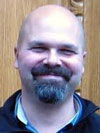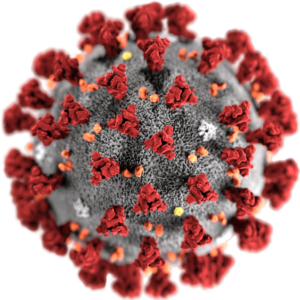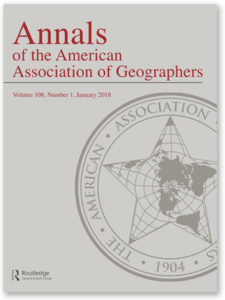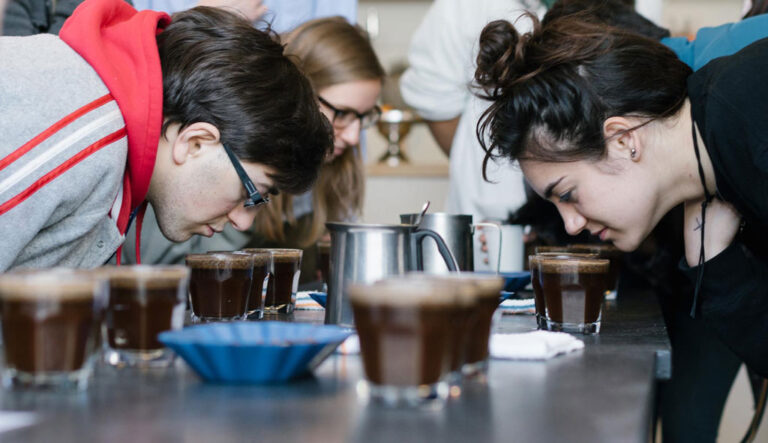Doing Geography in the Age of Coronavirus or How is Everybody Coping?
 You hear it from everyone you know: these are strange and frightening times. While most of us have witnessed major disease outbreaks from afar – Ebola, SARS, Swine Flu – it is another thing to encounter something so directly, so personally, so comprehensively. Pandemic: what once seemed part of a grim historical record has smashed into our contemporary reality.
You hear it from everyone you know: these are strange and frightening times. While most of us have witnessed major disease outbreaks from afar – Ebola, SARS, Swine Flu – it is another thing to encounter something so directly, so personally, so comprehensively. Pandemic: what once seemed part of a grim historical record has smashed into our contemporary reality.
If you are one of the lucky ones, you are reading this inside your comfortable home, self-isolating, dashing out only to gather the most essential items. If you are one of the lucky ones, you are struggling to refit your classroom activities, your research, your office operations, your interactions with colleagues, and your accessibility to other people within this extraordinary era – pushing everything from the physical to the virtual realm. Maybe you also have children at home who want to be with their friends, or now need to be home-schooled. A hassle for sure, but hopefully something we will come through.

Of course not everyone is so lucky. Some are still on the front lines, making this strange new world tenable for the rest of us. Medical care workers of all sorts, people working for essential services or industries, people who must put themselves in the middle of this pandemic every single day. Still others are ill from the disease or care for sickened loved ones. And then there are those who have lost their jobs because of virus-related shutdowns or whose existing precarity threatens to push them over the edge. Poor pupils worried about the loss of their school lunches and struggling without secure internet connections. Students blocked from conducting their long-planned research and who may also be anxious about paying their rent. Job seekers who have just seen their prospects shrivel up. And junior scholars fearing how this might affect their tenure clock.
In my columns I have tried to touch on issues that affect some of us. The coronavirus threat is an issue that affects ALL of us in a way unimaginable just a few short weeks ago. It is important for us to remember that while the effects and the worry are universal, the outcomes are uneven. What for some of us may be an annoying inconvenience can prove to be truly horrific for others.
For those of us leading the AAG, the past two months have been challenging but manageable. As it became clear that the novel coronavirus would be so much more than a small disruption, we made the difficult decision to cancel our annual meeting, the first cancellation since the United States entered World War II. While the decision seems obvious now, we knew that many, many of our members would be seriously disappointed as the annual meeting is one of the highlights of their year. We also realized that all of the careful planning conducted by the AAG staff and so many in the membership would be upended.
Even before we decided to cancel the in-person meeting, the staff was working on ways to allow some of the existing sessions to be conducted virtually. So far we have 150 virtual sessions ready for the AAG conference week. The platforms that are being assembled should allow for a fairly smooth operation for those who participate and attend. If you have already registered for the Denver meeting, you can attend these sessions free of charge and use your registrations for future meetings, while others pay a nominal fee. We will continue with the AAG council meeting (virtually of course) and hold the AAG business meeting. And we have a prepared a wonderful book, The Rocky Mountain West: A Compendium of Geographic Perspectives, which is available on the AAG website.
Of course there are so many aspects of the AAG annual meeting that cannot be done virtually and several of these will be postponed. Many of the themes for Denver will continue in Seattle (along with some new themes) and participants are invited to continue their sessions as they had already intended. I have reached out to the marquee participants for our Denver meeting and most have agreed to return next year. The presidential plenary will be a joint affair with president-elect Amy Lobben and myself looking at issues of marginalization, accessibility, and expanding the geography community. Past-president Sheryl Luzzadder-Beach will be able to present her address next year. We are working to make sure all of this year’s honorees will get their rightful due at next year’s Awards Luncheon. And the best news is that the AAG will host the annual meeting in Denver after all, in March 2023. It will be an opportunity for us to make good on all the work and preparations conducted by the local arrangements committee and local professionals.
Our annual meetings are so much more than sessions. They are opportunities for us to affirm our place in the geographical community. They provide a way for people to meet and connect with those they have only encountered on paper or online. They give students a much-needed boost in their professional development and networking. And they reignite old friendships and foster new ones. To continue with this, we hope that geographers consider some of the other options offered in Fall 2020. I have long championed the value of regional meetings, and this will be an opportunity for many of us to explore these. While we had intended to provide publicity for the regional meetings in Denver, we will be sure to advertise these over the summer. Other meetings, such as Race Ethnicity and Place, Geography 2050 and the Applied Geography Conference should go forward as we overcome this affliction.
How this novel coronavirus changes us is open to speculation. But I have no doubt that the modifications to our society and to our geography will be profound, exceeding the transformations wrought by 9/11. Everything from personal hygiene to store design will harbor the possibility of a new pandemic. Right now, geographers can provide the necessary analytics and visual tools to help all of us understand the impact of the virus today. Looking toward the future, there will be ample opportunity for geographers to unpack all of the implications of this unprecedented and devastating disease.
But now is a time to step back. Many people are hurting. Many more are scrambling. First, take care of yourselves and your families. Then take care of those to whom you are directly connected – your students and the people who depend on you – inasmuch as you can do so. Look out for those who may be fearful and alone; there are more like this than you think. Be kind to one another. Keep your physical distance, but preserve and enhance your social community. The world has become a scary place. We need connections – now more than ever. Please help make these connections happen.
— Dave Kaplan
AAG President
DOI: 10.14433/2017.0070


